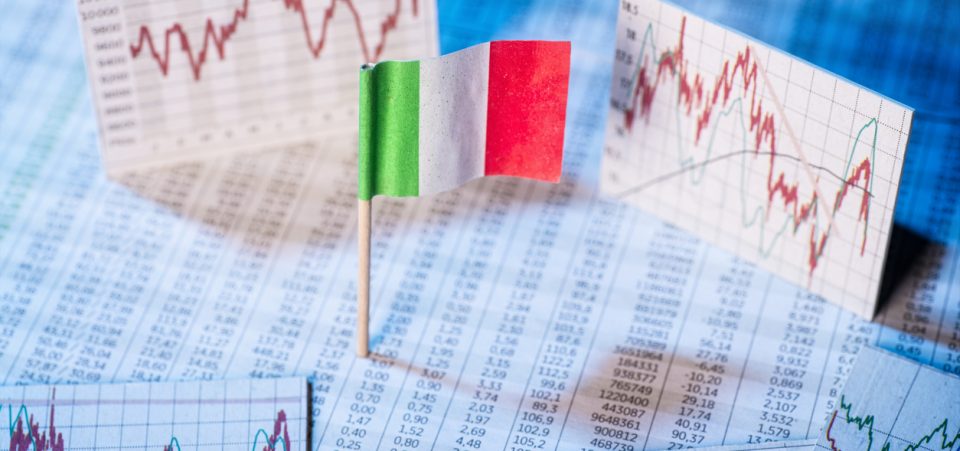Italy’s Political Crisis Has Potential to Trigger Massive Stock Market Crash
Italy’s latest political experiment has failed before its protagonists have even had a chance to set up the test tubes and Bunsen burners. In its place, the emerging political crisis has all the elements to generate the political storm of the century.
Could that also mean the stock market crash of the century?
Europeans will be on the lookout for the euro and the tenure of the major stock exchanges, but Wall Street also risks a stock market crash. Finance and economics, for all of President Donald Trump’s efforts to rewrite the rules of trade, are a global affair.
And they will remain so for years to come. Therefore, what happens in Rome can affect what happens in New York—and Wall Street, specifically.
Italy Could Become Another Greece, Only Many Times Worse
The Italian situation is, as some have said, reminiscent of Greece. Only it’s amplified several times over by Italy’s role in the world economy.
The markets could experience another Greece 2014–2015 situation. From German Chancellor Angela Merkel and others among Europe’s highest representatives, there have been calls for Italy to find stability.
The markets don’t like uncertainty, especially when it affects one of the world’s seven-largest economies.
The Italian vote is all about uncertainty, because one of the most pro-EU countries has expressed a vote, which— understood at the basic level—expresses doubts about the tenure of the European Union itself.
If some EU countries were prepared to let Greece walk away, they won’t be in Italy’s case. And this will generate tension on what is the richest economic and political union in the world: the EU.
Yet, even more than a single stock market crash, the Italian situation could trigger another protracted recession in Europe. And the United States would not be immune from the resulting shock.
The U.S. Won’t Be Immune
Not only could Wall Street collapse, the U.S. could pick up from where the Great Recession left off. After all, many of the causes and effects of the 2008 financial crash remain. Thus, the U.S. market is vulnerable to catching colds from abroad.
The fact that the president of the Italian Republic (who acts as a guarantor of the constitution) has appointed a former International Monetary Fund (IMF) executive director and unelected official, Carlo Cottarelli, to form a government will not please most Italian voters.
The March 2018 elections overturned the establishment parties. In Italy’s political system, the parties carry more weight than the prime minister.
The appointed PM has the task of leading Italy to new elections while also addressing key issues. The problem is that the key issues are less about what Italians want, need, or voted for, and more about what the European Union (Germany in particular) demands.
The focus will be less about economic growth and more about addressing the public debt.
Unlike the United States, Italy cannot print more currency to avert the effects of its debt. Italy is bound by the rules of the euro.
The consequence will be more malcontent. And the so-called populists will probably secure an even stronger result in the next election.
Except that, rather than the mixed left/center-oriented Five Star Movement, the risk is that many more Italians will express support for the far-right xenophobic parties.
1922 All Over Again?
The situation in Italy is becoming remarkably like that which brought Benito Mussolini to power in 1922 in Rome, or even one Adolf Hitler in Berlin a decade after.
The formula is one of protracted crisis. A stock market crash is not even the worst effect that the Italian political situation could produce.
All the ingredients exist to fuel the worst political crisis in modern European history (excluding the break-up of Yugoslavia and related issues like Kosovo) since World War II.
Effectively, the political outcome of the Italian president’s decision will be to encourage conspiracy theories.
No doubt, many of those who voted for the winning non-mainstream (or “populist,” as some say) parties Five Star Movement and Lega will attribute the rejection of their choice for finance minister as an IMF plot.
And it all comes down to a growing diffidence of the euro in Italy (one of the four founding members of what in 1993 became the European Union).
The Euro Is but One Problem
The euro is merely one, and not even the most important, victim of the political crisis in Italy. The biggest victim, which has a global dimension, is risk. Or rather, a sudden lack of appetite for risk.
It’s unclear how Wall Street will react in the medium or long terms. But eventually, if the Italian crisis prolongs, risk aversion will intensify and the Dow Jones will not remain immune.
The government imposed on Italians will have the task to support the euro and lead Italy to a fresh election. It will most likely be held in mid-or late-September.
Despite the stability pretense, the effect of this government will be to extend the anxiety. Meanwhile, the euro-skeptics and right-wing hardliners will likely attract more voters, disappointed in what they see as interference from Germany and France, in particular.
In June 2015, when the Greek political crisis intensified, the world markets—including Wall Street—suffered significant losses.
That was Greece. Italy has a bigger market and a much bigger role in the global economy, one that no major stock exchange or government can ignore. The European exchanges have already started the hemorrhage.
Americans think that they are immune to what happens in the rest of the world. And they’re often the last to notice when problems begin in the periphery.
Deep Political—and Deeper Financial—Crisis
The reality is that Italy has sunk into a deep political crisis. The way out is more an omen than a promise.
The probability is that the next elections will promote the extreme parties. They will win a sufficiently strong majority as to be able to form a government without the need for alliances with moderates.
In the interim, the menace will be that of Italy grinding to a halt. Cottarelli, the prime minister designate, is known in Italy as “Signor Forbice” or “Mr. Scissors.” He earned his nickname while working at the IMF, advocating cuts to government spending.
Cottarelli will spend his term looking for ways to cut Italy’s debt. He will encourage fiscal austerity in a country that has already been forced to absorb more than 10 years of austerity.
Many Italians don’t speak English very well, but almost all of them understand what “austerity” means.
All investors, including Americans, may use the Italian crisis as an excuse in the short term. It’s admittedly an opportune moment to close positions and take profits.
But the larger stock market crash, however treacherous international finance might be now, will come later in the year.
Other Problems Are Brewing in the EU
If Italy weren’t enough, France’s President Emmanuel Macron has come under fire at home amid intense street protests in major cities. His economic reforms are not popular.
And then there’s Spain, where the current government led by Mariano Rajoy is under fire from the opposition. The Spanish government could fall, leading to fresh elections and the possibility of more hostility to the euro.
The combination of the brewing political crises is all pointing to one thing: either Europe and the euro change and adapt to the needs of Europe’s South—still suffering the effects of the 2008 financial crisis—or the EU breaks.
Italy’s ruling class has used the threat of a major stock market crash as a sword of Damocles.
The financial situation in Italy, as in Greece in 2015, has been used as blackmail. The impression that many Italians have is that markets count more than citizens. It’s an opinion with long legs, and one that the EU leaders should not disregard.
The EU cannot ignore Italy’s problems—from excessive German domination of the euro and the enforcement of austerity measures to additional steps to control Italy’s finances—as in the case of Greece.
The EU Must Tread Carefully
Italy is one of the founders of the European Union, and its economic crisis will not be limited to Rome. It will spread throughout the EU and possibly force Brussels to look at things a little differently.
Invoking stability and acting in its name will no longer work. Various EU states have tried that route. And they found nothing but trouble, which has inspired a new wave of populist parties.
Americans, after reading this and other articles on Italy’s political machinations, may well wonder why and how these stories could affect their investments.
They would be wrong to ignore the risks, but there’s no need to understand the details. Rather, American investors need to beware that a problem exists with the potential to trigger a massive a stock market crash and another global financial crisis.
Uncertainty in Italy is no guarantor of stability elsewhere. And there’s no easy way out. Financial austerity and more job cuts will lead to an extreme situation and a dangerous political extremism that could break up the eurozone.
Whether John Q. Public in Texas or Idaho can even locate Italy on a map, he will soon find out that a crisis there can trigger a major stock market crash in New York.






